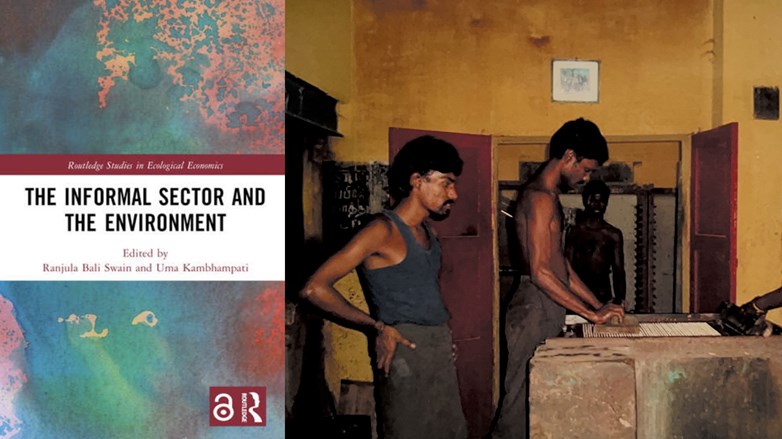New book on the informal sector and the environment
Ranjula Bali Swain and Uma Kambhampati argue that "The root causes of informality include elements related to the economic context, the legal, regulatory and policy frameworks and micro-level determinants such as a low level of education, discrimination, poverty, lack of access to economic resources, to property or, to financial and other business services and markets. While our book discusses the various challenges that the informal sector throws up, it also highlights its useful role in facilitating sustainability. The dominant narrative on the policy front is that of formalising the informal sector, however, significant possibilities can be generated by improved technology and the co-operative structure which could be explored further”.
This edited volume is recently published in August 2022 and focuses attention to this as yet relatively unexplored field. Through various contributions from exponents of the informal sector it discusses why the informal sector is a major reason behind the environmental degradation accompanying the expansion of economic activity. Environmental regulation and economic incentive policies are difficult to implement in this sector because economic units are unregistered, geographically dispersed and difficult to identify. Also, given their limited capital base, they cannot afford to pay pollution fees or install pollution abating equipment. Informal manufacturing units often operate under unscientific and unhealthy conditions, further contributing to polluting the environment. The book emphasizes and examines these challenges, and their solutions, encountered in various sectors of the informal economy, including urban waste pickers, small-scale farmers, informal workers, home-based workers, street vendors, and more. If the informal sector is to "Leave no one behind" (as the Sustainable Development Goals promise) and contribute to "inclusive growth" (an objective of the green economy), then its impact on the economy as well as the environment has to be carefully considered.
A massive challenge for the textile industry
Center for Sustainability Research’s Susanne Sweet has written an Open Access chapter of the book titled "Exploring the environmental and social impact of informal market practices in the apparel industry", that specifically focus on the highly globalized textile industry and its informal practices in its complex value chain. Production occurs primarily in low-income countries where unsustainable and informal market practices are rampant. Up to 80 percent of employees are in informal employment in several of the garment producing countries. The organization of informal activities for the global market are often embedded in and intertwined with formal market activities in complex networks of market exchanges, making the transparency of social and environmental consequences difficult.
Sweet argues that this practice risk to hamper the development of social and environmental improvements since the production countries can avoid investments in clean technology and improved labour practices keeping world market prices competitive and, at the same time, benefit buyers with low-priced goods. According to Sweet, a transition away from informal production practices in the textile and apparel sector would likely benefit from collaborative efforts between international and national governmental bodies and entities in the private sector, who together could drive more inclusive and formal practices with less negative social and environmental impact.
The book marks a significant contribution to the literature on both the informal economy and sustainable development.

